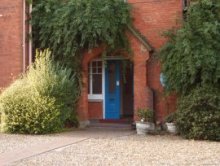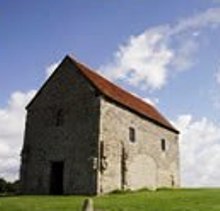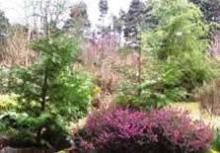| |
|
 |
Christian Ecological Retreat Centres announce eco-initiatives
Last updated: 28 June 2010:
More and more Christian retreat centres around the UK have been sharing the ways they demonstrate a commitment to reducing their carbon footprint and make a positive contribution to environmental sustainability. Information about some of them has been circulated through the EcoRetreat Newsletter, put together by ARC and, below, you can find details of some centres that are making a realdifference.
Read more:
Archive of Eco Retreat Newsletters
Leaflet on the ARC Eco-Retreat newsletters
Some examples of EcoRetreat centresEmmaus Retreat Centre in Bristol
Emmaus House is based in the very centre of Bristol’s Clifton village – an urban retreat centre built from two adjoining 18th century houses. There are residential bedrooms, as well as four conference rooms, seating between 12 and 70 people, a kitchen which caters for breakfast, lunch and dinner, using much of the organic produce from its own garden, a chapel and a large white meditation room that looks over the gardens. At their General Assembly in 2006, the La Retraite Sisters, in a spirit of solidarity and support, chose “to encourage greater respect for the earth and a commitment to the sharing of its resources”.
Emmaus House enjoys strong connections with local Catholic schools, running Away Days along retreat lines which are proving popular with the children and staff. One of the more interesting programmes was with St Bonaventure’s primary school, which was already engaged in a project converting some wasteland into a flourishing garden, culminating in a day at Emmaus House for the older primary school children to celebrate creation. They started in the Meditation Room “because kids love silence” and then explored the different gardens in groups. Each child was invited to bring something that drew their attention from the garden into the house. They named these things, and looked at them with great care. At the end of the day, the children prayed and gave thanks to God for their stone or flower or snail, which they themselves had named.
Rural (see below for urban retreat centres)Dyffryn Farm in Powys, Wales
Dyffryn Farm in Powys has 31 acres of organic farmland and garden. It produces its own lamb, mutton, fruit and vegetables in addition to firewood. And have a policy of either producing their own food or buying locally. Visit
www.dyffrynfarm.co.uk
Ffald-y-Brenin Christian Retreat Centre
This Retreat Centre in Wales has won the following awards: The Prince of Wales award for “the sensitive development of an uplands farm into a Christian Retreat Centre”, The Templeton Project Trust prize of which HRH The Prince Philip is a Trustee, and The Pembs Coast National Park annual project award for the planting and development of a wood – 2000 broadleaved trees were planted. They have a large meadow sown with wild flowers and produce local and organic meat, eggs and vegetables. They attempt to “eat the view”. Ethical considerations are at the forefront of their purchasing considerations. For more details go to:www.ffald-y-brenin.org
Hilfield Friary, Dorchester
 |
 |
 |
House of Prayer in Surrey |
The Friary is set on the north-facing slope of the Dorset Downs, an area of outstanding beauty, with views over the Blackmore Vale and towards the Mendip Hills. Hilfield has 19 acres, part of which has been designated as a site of Special Nature Conservation Interest. The aim is to manage the land to enable the greatest possible diversity of plant life and animal habitat. As followers of St Francis of Assisi, "The Patron Saint of Ecology", Hilfield is keen to encourage others to share with them through working on the land and by reflecting on their relationship with the environment.
Hilfield welcomes individuals and groups and offer both self-catering and full board accomodation. For more details about accomodation and special days and course, visit:
www.hilfieldfriary.org.uk/.
If you are interested in short term volunteering over the summer break, please telephone: 01300 341741.
Holland House Retreat, Conference & Laity Centre
Just starting out on its journey to become a “Retreat Centre in Harmony with Creation”, Holland House in Worcestershire uses its own fruit and vegetables. It is making changes to introduce fresh, local and organic produce - moving to an ethos of deliberate choice. It wants to register also as a Protected Environment (owning several acres of land and a 70 yard section of River Avon).
Link to www.hollandhouse.org
Mill House
The centre is based around a large Devon Farmhouse, currently with 12 beds in six rooms.
The Centre runs retreats for Christians and others seeking spiritual companionship and solace. It includes creative workshops. “Story is very powerful,” Rev. Jane Taylor said.
The centre recycles, uses good energy, composts, and uses a reed bed sewage system. The system works by collecting outflow from showers, baths etc into a dosing chamber. When full it is flushed onto a specially constructed reed bed about 20m by 8m in area – big enough for the retreat centre to extend in the future – which cleans the water naturally. The cost is between £9000-£11,000. Rev Jane Taylor commented: “It is expensive, but ... the reed bed system is natural, and in the end I believe it will be cheaper too.”
Mill House have chickens and pigs ranging freely in the cider apple orchard to produce their own meat and eggs. They also grown their vegetables. In the future they plan to expand into outbuildings, probably using ecological materials and look further into fuel and water issues. For more details about the centre, go to www.millhouseretreats.co.uk/.
In April 2009, Mill House Retreat celebrated its 5th anniversary. They invited old and new friends to
give thanks for all that has taken shape over the past five years and to look forward to what may unfold in the next stage of its life and ministry.
Mill-Leat Ministries at Felindre Cottage situated in the foothills of the Brecon Beacons see themselves and all creation in relationship to the earth and its produce. They produce all their own organically grown fruit, vedgetables and eggs from free to roam chickens. They also recycle everything that is recyclable.For more information, visit www.mill-leat.org
Minsteracres Retreat Centre in County Durham
Minsteracres is in the process of becoming more self sufficient; using vegetables grown in the walled garden, composting, recycling and working with refugees and people with learning difficulties from nearby Newcastle to develop fruit/vegetable gardens and other initiatives. The Centre owns 60 acres of land which is rented out to a local farmer: it is however in poor repair and the team are looking at possibilities of alternative land use. Future plans include improving conditions for wildlife in their 13 acre parkland, and investigating the possibility to use renewable energy. They also hope to have their own hens next year. Minsteracres Retreat Centre is situated in a beautiful rural area of North East England and welcomes people of all faiths and none. Link to
www.ministeracres.co.uk.
Lee Abbey is a Christian-run conference centre in a Victorian house in the middle of Exmoor National Park, running a 115ha estate, including a 70ha forest and a farm with around 150 sheep. It has a capacity of some 120 guests at any time (not including residents at the Beacon Youth Activity Centre) and some 9000 visitors a year, some of whom come for day-conferences, but mostly residential. Lee Abbey has had a full-time Environment Officer since March 2007. The Abbey works with "Natural England" to manage 115 ha. estate more ecologically and has recently completed the installation ofl a hydro-electric system. The Abbey recycles 33 percent of waste, has installed low-energy lightbulbs and is looking at paper usage. They have future plans to improve insulation and are considering a biodigester, a biomass boiler and solar panels and wind turbine. Lee Abbey is very interested in comparing experiences with others trying to run large kitchens in an environmentally friendly way. For more details link
here.
The Othona Community at Bradwell
Situated in the most beautiful and remote part of Essex, but easily accesible from London, the Othona Community at Bradwell-on-sea is on a seven acre site 20 metres from the sea, and beside a 6th century chapel and a site of special scientific interest. The Community generates its own electricity and is now off-grid thanks to a combination of a wind turbine and a solar hot water system. A sustainable Solar Building was completed in 2011 using recycled and reclaimed materials and a 'rammed earth' technique to build walls from local mud and straw. The community also uses a reed bed to filter waste water and contribute to biodiversity
The community also produces an abundance of apples and plums each year, and sources food locally or through fair trade outlets wherever possible. Othona is a Christian Community "open to those of all faiths and none". It is family-friendly and accesible for those of limited mobility. As well as running residential themed discussions and hosting local groups, the Community runs events for school groups with a focus on the ecology of the area and sustainable living. Link to www.othona.org/.
Reflection Gardens
The retreat is based around a set of gardens themed from the Spiritual Exercises of St Ignatius of Loyola to make connections between the Christian spiritual journey and issue about care for the environment. The Centre, based in Staffordshire, tries to live out the spiritual and environmental messages of the gardens. They have a vegetable garden which is essentially organic. Visit www.reflectiongardens.org.uk
Ringsfield Hall on the Suffolk-Norfolk border runs sessions for Churches on environment, theology and lifestyle, and for schools on how the earth works and how we can take better care of it. They are an Eco Centre under the same scheme as Eco Congregations, have solar panels, and use power from Good Energy, which is 100 percent renewable energy promoted by Operation Noah. Link to
www.ringsfield-hall.co.uk/ for more details.
 |
 |
 |
The chapel at Othona, Bradwell. |
In Durham, St Antony's Priory Ecumenical Spirituality Centre are seeking to grow more of their own produce for lunches and bake all their own bread, with fair-trade ea, coffee and bananas. They have a small house with 6 bed spaces and many day visitors. Their community SSM is engaging in feasiblity for alternative energy sources at their houses.Link to www.stantonyspriory.co.uk/
Sarum College, Salisbury
Sarum College is an ecumenical study and research centre based in Salisbury’s Cathedral Close in Central Southern England. The College attracts scholars and students throughout the UK and enjoys an international reputation for excellence in theological education and spiritual reflection. Bridging scholarly thought and the church, Sarum welcomes people of all faiths and none, offering time and space for enquiring minds to grow in wisdom and courage. Sarum is taking steps to become more ecologically sustainable by setting targets for sourcing food and energy locally. Free range eggs and local pork are already on offer at Sarum.
Link to www.sarum.ac.uk
Sarum College is the venue for a unique workshop taking place focussing on faith in water in July 2009. (Please note the event will not be open to the public), Press Release for Faith in Water Workshop: 5-7 July 2009.
St Beuno's
St Beuno's Ignatian Spirituality Centre is situated in
Denbighshire, North Wales. Gerard Manley Hopkins, the Jesuit priest and poet, stayed there for three years, between 1874 and 1877 and produced some of his best work there, including “God’s Grandeur”, “The Starlight Night”, “The Sea and the Skylark”.
 |
 |
 |
The vivid trees and plants in Whitchester's grounds. |
An energy audit was commissioned by the Carbon Trust in 2007. Old tennis courts are being transformed into formal gardens with raised beds intended for herbs and fragrant plants. Ponds are fed by natural groundwater and contain plants, fish and tadpoles supplied by a local pond which was filled in. This new natural water habitat is visited by dragonflies and a heron, and offers a tranquil respite. St Beuno's offers a wide range of retreat programmes. For further information visit: www.beunos.com
Stod Fold Barn
Situated in West Yorkshire, Stod Fold Barn is a very small, self-catering centre. The centre follows CAFOD's 'Live simply' campaign www.livesimply.org.uk, encouraging recycling, ethical shopping and energy saving. Link to www.stodfold.co.uk
Whitchester Christian Guest House & Retreat Centre
In the Scottish Borders Whitchester Retreat Centre grow some of their own vegetables and a significant amount of fruit. They offer locally sourced free range eggs, lamb and game meat. They are members of Green Tourism and have a silver award. To find out more link to www.whitchester.org.uk
UrbanThe Wesley
Formerly known as the Methodist International Centre the Wesley was the first ethical hotel in London. It is a social enterprise, which provides hotel services, meeting facilities and hostel facilities for students in their centre near Euston Station in Central London. It is committed to minimising the environmental impact of its activities, in line with its Methodist origins, and has a fully environmental and compassionate food sourcing policy. It is also recycling, looking to use more environmentally responsible suppliers, and addressing its transport footprint. The hotel has targets for energy efficiency, procurement, waste management and environmental education. Their aim is to protect and enhance the environment whilst minimising the impact of our business activities.Link here for more details.
House of Prayer, East Molesey is in the early research stages of looking at alternative energy, and would be glad for advice from other small retreat centres that have already gone along that path. Visit www.christian-retreat.org
Woodbroke
Woodbrooke is Europe's only Quaker Study Centre. It is based in the former family home of the local chocolate maker, Quaker George Cadbury, and since 1903 has provided education for those of any faith or none from around the world. Woodbrooke makes every effort to function ethically and without harming the planet.
www.www.woodbrooke.org.uk/
LinksArchive of Eco Retreat Newsletters
|
 |
 |
|
|
|
|
|
 |
Projects overview
A complete listing of all current ARC projects |
 |
March 12, 2010:
Sikhs celebrate March 14th as Sikh Environment Day
Sikhs around the world are being invited to celebrate Gurgaddi Diwas of the 7th Guru, Guru Har Rai ji,as a Sikh Environment Day |
 |
ARC and the Faiths
Faith communities are working in countless ways to care for the environment. This section outlines the basics of each faith’s history, beliefs and teachings on ecology. |
 |
 |
|
|

